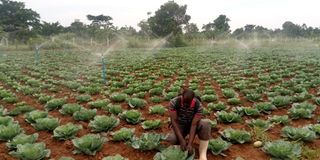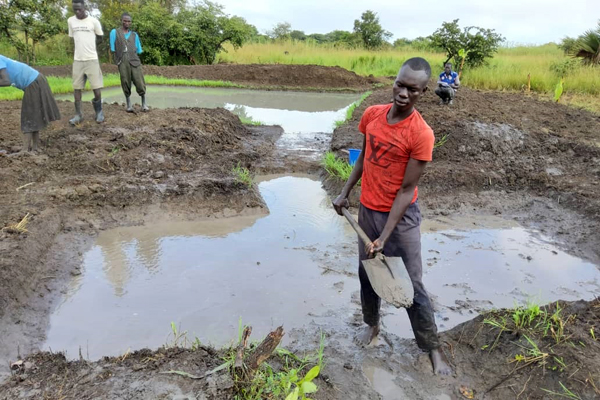Irrigation helps locals beat deadly dry spell

A man in his cabbage garden where he uses irrigation in Mulwanda A, Namayingo District. PHOTO/FRED WAMBEDE
What you need to know:
- Residents say the rains have continued to be irregular, leaving them on the brink of famine.
For many years, the residents of Aukot Sub-county in Soroti District have been relying on the natural rainfall seasons to grow crops and feed their families.
But over the last three years, rainfall has greatly reduced, while the dry spell has continued to spread, creating food insecurity in the area.
The locals have been relying on natural rainfall patterns to grow crops such as cassava, sorghum and groundnuts.
But aware of the looming problem, the central government working with area leaders has introduced irrigation to the area.
The residents have now started growing crops and vegetables using irrigation.
“This is peculiar to us but it’s the best alternative now to save us and our children from looming famine,” Ms Maria Echoru, one of the residents, told Daily Monitor on Monday.
The residents grow cabbages, watermelon, green pepper, onion, pumpkins, tomatoes and Sukuma Wiki with the help of solar-powered irrigation systems established by the government.
Among the schemes constructed by the ministry of Water under Water for Production programme in the district include Awoja solar-powered irrigation system in Autot Sub-county, Opiyai small scale irrigation in East Division, Soroti City, and Alere small scale irrigation in Katine Sub-county.
Mr Timothy Ecidu, a farmer under the Alere irrigation scheme, said provision of water for production is improving their livelihoods.
“The crops we are growing have a ready market and are grown throughout the year due to availability of water,” Mr Ecidu said.
Farmers at Opiyai irrigation scheme say in the first season, they made sales of about Shs29m and in the subsequent two seasons, they made sales of Shs20m and Shs18m, respectively. The farm sits on 14 acres with a total of 16 farmers.
The government is pushing for the growing of quick maturing crops as one of lucrative enterprises with potential to pull Ugandans out of poverty under the Parish Development Model (PDM), which was launched in February.
Other enterprises under PDM include piggery, bee farming, fish farming, dairy farming and poultry
Mr Chris Ogulei, the chairperson of Aukot Sub-county, said the irrigation scheme has promoted crop production and improved household income in the area.
The district chairperson, Mr Simon Peter Edoru, said government should construct more irrigation schemes in Teso sub-region.
Mr Ogulei made the remarks at the weekend during the final technical inspection of Awoja irrigation scheme in Awoja Village.
“More irrigation schemes should be constructed in other sub-counties and the farmers should be taught to add value to their produce,” he said.
Mr Paul Otuba, the assistant chief administrative officer for Soroti, said irrigation is one of the efforts by the government to fight the problem of unpredictable rainfall.
“The government is determined to solve the problem of erratic rains and also fight food insecurity as it attempts to push the country into middle income status,” he said.
Eng Patrick Okotel, the regional manager of Water For Production, said in the next financial year, they are planning to construct more six solar powered irrigation schemes.
“These schemes are part of President Museveni’s directives to implement solar powered irrigation schemes near watersheds across the country,” he said.
Other schemes that have been constructed include Limoto in Pallisa, and Mulwanda A in Namayingo District.
Eng Okotel said since Teso is susceptible to floods, which come from Karamoja and Mt Elgon sub-regions, the government will construct large valley dams in the sub-region.
Drought
Towards the end of the second quarter of 2021, Uganda experienced a prolonged dry-spell after rains expected to start in March-April up to May-June did not come in sufficient amounts. The drought affected many parts of the country, according to a Daily Monitor survey, with farmers saying they incurred losses caused by poor germination, especially of cereals which constitute most diets in Uganda.




